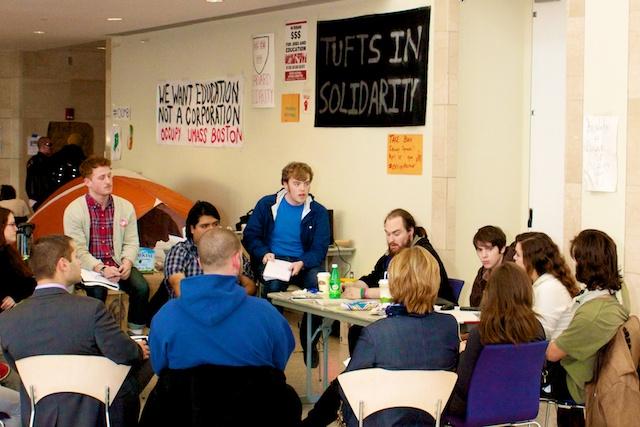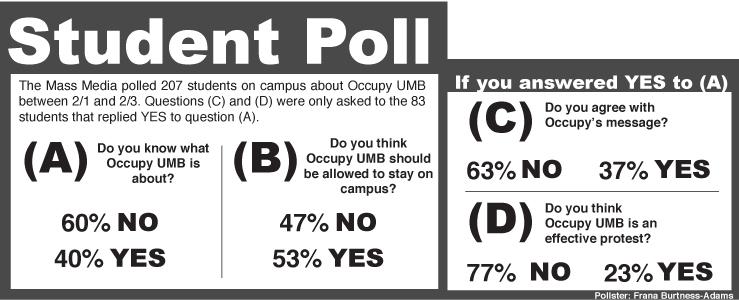With one eviction scare, two official letters, four tents, 190 “likes” on Facebook, and numerous General Assemblies, Occupy UMB is now entering its third week on campus with no end in sight.
Advocating for freezing fee hikes, keeping class sizes small and holding the Board of Trustees accountable, Occupy experienced its first major bump in the road on Thursday, Jan. 26, when protesters interpreted a letter from the administration as an eviction notice.
In the letter, Vice Chancellor for Student Affairs Patrick Day and Provost and Vice Chancellor for Academic Affairs Winston Langley asked the protesters to limit their occupation to Campus Center hours of operation, between 6 a.m. and 11 p.m.
Associate Dean of Students Mark Jannoni said that he would not describe the letter as an eviction notice.
“It’s more of a request,” Jannoni said. “We are willing to treat them like any other student group provided they follow the protocol that any student group would have to follow.”
This message, however, was not effectively communicated to the occupiers. After receiving the letter, protesters spread the word about an impending eviction, prompting more than a hundred people to show up on campus that Thursday night in solidarity with the movement, many of them not UMass Boston students. Eviction never came.
It is still not clear whether the University plans to take any action to remove protesters from campus overnight. Jannoni, who has attended several General Assemblies, said that the University wants to have a dialogue with occupiers.
“To throw students out or to have them arrested is not educational,” he said. “I still want to know what their final demands are. I want to take their concerns to the people who need to hear them.”
One issue on the occupiers’ list is the UMass Board of Trustees. Among its 22 members, five are students, but only two of the students are allowed to vote in the course of the school year. Therefore, for any given action item, two out of the 19 votes belong to students. This year, the student trustees with voting rights are from UMass Dartmouth and UMass Lowell.
UMass Boston Student Trustee Bianca Baldassarre said, however, that students are well represented, and that she and the other non-voting student trustees “can speak freely to the Board.”
Addressing a sign near the Occupy camp, which states that the Board intends to raise the parking fee from $6 to $14, Baldassarre said that the Board has not discussed the issue and that she has not heard of such an increase.
On Wednesday, Feb. 1, nearly a week after the administration issued its letter, the Undergraduate Student Government (USG) passed a resolution entitled “Re: Occupy University of Massachusetts Boston.”
Never mentioning the word “occupy” or addressing the protest directly in the body of the text itself, the resolution gave a technical definition of what it means to be a UMass Boston student, commended the university for a having an official “free speech zone” on the circular lawn in front of the Campus Center, and expressed support to the administration’s efforts to enforce university “policies and procedures.”
In response to the USG resolution, protester Daniel Wilder said that most students agree with the issues Occupy is bringing up.
“The problems the occupation is having have to do with the expression of these ideas. Some feel uncomfortable in the space, or feel that we’re bringing in too many non-students.”
Wilder said that non-UMass Boston students are not invited by Occupy, but that the Campus Center is a public space.
“We want to be as sensitive to student opinion as possible. We at Occupy don’t think our voices are more important than those of other students. That’s why we’re constantly changing, trying to find a configuration that students feel comfortable with supporting.”
Students on campus have had a mixed reaction to the occupation. In a Mass Media poll of 200 students, only 40 percent said that they knew what Occupy UMB was about, and 47 percent said that occupiers should not be allowed to stay on campus. Out of the 80 students who testified that they knew what Occupy UMB is about, 63 percent said that they disagreed with its message and 70 percent said that it is not an effective protest.
60 percent said you did not know what Occupy UMB was about. History major Gary Uter said he supports the protesters’ right to voice their opinions.
“It is important that people are able to express themselves and stand up for what they believe in, so I commend them for that, as long as it is not negatively affecting anyone else,” said Uter.
Others, like psychology major James Bouhuys, are less supportive of the movement.
“They are mad at the fee’s increase and don’t think we should have to pay it, and I see their point but they are not going to affect change by walking around with microphones and sleeping in a tent saying ‘Occupy UMass’ and ‘Follow on us on Twitter.’ It is just not going to do anything,” Bouhuys said.
A group of students started an online petition against the protest. On its webpage the group asks Occupy UMB to remove its tents from the first floor terrace. The website reads, “[Occupiers] have become a detriment to the environment of UMass Boston, one of academic excellence, creativity, and most importantly, respect.” 54 people have signed this online petition as of Feb. 6.
Another petition is circulating among students in the hands of history major David Balch. Balch’s petition addresses several of his concerns. These concerns include the occupier’s infringement on other groups’ rights to reserve the first floor terrace, the apparent non-students’ use of UMass Boston facilities, and behavior that is upsetting and distracting to students attempting to work within the Campus Center. Balch’s petition has 104 signatures as of Feb. 6.
The occupiers plan to protest during the Board of Trustees meeting on Feb 7, aiming to transform the Board of Trustees into a more democratic, student-oriented body.






















































